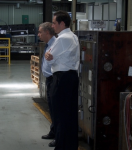A lean sensei is neither consultant nor coach
The difficulty in describing something new is not to bring it back to existing labels. If sensei was the same as expert, coach, doctor or consultant, I’d happily be using those terms.

I’ve been working for the past five years with a group of retired executives who used to practice lean in their jobs (with a sensei) and are now sensei-ing other execs, and we’re trying to figure out how sensei is specifically different. Attitude and intent do matter (we haven’t found a way to replicate this to make big bucks, for instance ;^), but not only attitude.
What we’ve found is:
- a sensei must be committed first to their own continued learning of TPS, and teaching it to others is a by-product of that personal quest;
- a sensei must be taught by a sensei, in a tradition that goes back to the original TPS group at Toyota, because there’s so much implicit knowledge in the tool interpretation you can’t learn this stufff from books and, as we all know from painful personal knowledge, we learn it wrong when we learn it on our own.
- a sensei must also understand the business language of finance and what goes on on the business chessboard to be able to see the bigger picture (not necessarily to advise (never) or to approve (hardly), but to get it).
- as sensei’s success is seen by their deshi’s progress – either growing the value of the company when they’re a CEO either getting promoted when they work within a corporate group
The distinction mostly lies in the commitment to learn all the learning structures of TPS as opposed to narrow it down to the one issue we’ve figured out and replicate it. For instance, it became progressively very clear to me that I couldn’t understand what Toyota did on the manufacturing shop floor until I started to see more clearly product design choices and engineering processes- something that my own sensei (“Father teach!”) had been telling me from the start, but I couldn’t see.
This also means we have no clear way of tackling the sensei-bottleneck: true senseis remain rare and difficult to work with. So far, I’ve not seen any successful sensei-making process in all the various atempts I’ve seen.
I’m getting a surprising amount of pushack on this piece – I can’t even remember writing it or what prompted it, but the deeper difficulty here is to continue to define the language of lean in ways that highlights how this is a new way of thinking rather than assimilate it back to tired old descriptions of how we used to work in the past.
So, no, the sensei is not a coach – at least not in the process consultant sense, yes, more in the sports coach sense. Certainly not a process consultant. In my experience the sensei is someone who points at specific things to explore and demonstrates the lean alternative way to think about some issues. But the sensei also has to know a lot about the industry and its dynamics, because truly, sensei discussion are far more equal to equal than psychanalytical. Content matters, always.
Titles people give themselves don’t mean much (look at me! Look at me: I’m the King of Business Novelists!) – but we can’t dismiss labels. My intent in discussing the distinction between sensei and consultant is exactly that, clarifying a new label, for a new activity that is ubiquitous in the lean literature (I’ve yet to see a true lean turnaround without a sensei involved – which is a huge problem in itself) that remains vague and myth-shrouded. I believe sensei are fully part of the lean puzzle, and it’s our job to clarify that part – regardless of how many people seem to want it to reduce it to stuff we already know.
In the end, you’re a sensei first if someone considers you their sensei, and then if there is someone you consider your sensei, in a line that goes back to the founders of lean.









